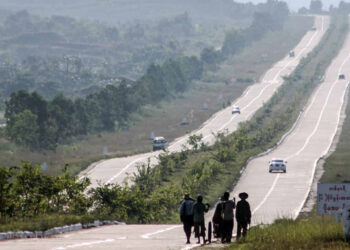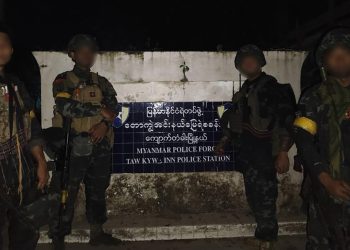Twenty-seven years ago today, demonstrations began across Burma demanding an end to the 26-year dictatorship of Gen. Ne Win. Eventually swelling to crowds of hundreds of thousands, the military government crushed the protests, killing thousands of people. In this article, first published in 2013, Irrawaddy founding editor Aung Zaw reflects on the lasting impacts of the 1988 pro-democracy movement.
CHIANG MAI, Thailand — It was 25 years ago that students led a massive uprising against military rule in Myanmar—an event that has shaped an entire generation and affected virtually every person in the country. After 26 years of disastrous decline under the regime of Gen Ne Win, the people of Myanmar had had enough. Little did they know then, when victory had seemed so near, that it would be nearly the same number of years again before they would finally begin to see the end of the long, dark night of oppression.
As a student at that time, I can clearly remember the exhilaration of knowing that the entire nation was behind us, that we could not possibly lose. But we were wrong. Though people came out into the streets in their millions all over the country, the military would not stand down. Too accustomed to holding power, and believing that only they could lead the way out of the crisis that they had created, the generals gave the order: shoot, shoot to kill.
And so thousands of young lives were mown down, and with them, the hopes of an entire nation. Some fled to the jungle to take up arms or seek allies abroad, while others went underground to defy the new regime from within. For more than two decades, an undeclared war continued to rage—a war on students, on the very people who had refused to lose faith in their country’s future.
They knocked on doors in the middle of the night: the military intelligence agents who didn’t care about the sobbing parents as they dragged their children away with hoods over their heads. They tortured and imprisoned any who dared to speak out against the regime. And when they couldn’t throw everyone who opposed them behind bars, the generals locked the gates to the universities, knowing they were breeding grounds for dangerous ideas, such as democracy and human rights.
Of course, students were not the only victims of the violence, which also targeted ethnic minorities and opposition politicians and affected everybody from poor farmers to rich businesspeople who fell afoul of the all-powerful generals. But it was students who were treated with the greatest distrust, because the weapons they wielded were their own minds, which refused to be yield to force.
Later, the junta refined its strategy for dealing with students: while keeping most campuses closed, it created new ones, banishing students to the distant outskirts of cities. Thus the prisons, home to some of Myanmar’s best minds, became in some ways the country’s most important centers of learning, while the universities, deprived of decent facilities and properly qualified instructors, became little more than holding centers for a dispossessed generation.
Now all of this has changed, or so we would like to believe. Students are no longer vilified in the state-run press, and most of Myanmar’s political prisoners have been freed. Some of the ’88 activists are now politicians, media people or artists, all determined in their own way to keep their struggle for democracy alive. Those forced to flee have begun to return, looking for ways to help rebuild the country they never really left behind.
There is some hope in the air in Myanmar today, but it is nothing like that of 1988. Then, it was possible to believe that the country could easily return to the days when, before the coup of 1962, it was seen as the most promising in the region. Now, there is half a century of rubble to remove before rebuilding can even begin.
But perhaps it isn’t necessary to clear away every remnant of the recent past, as we tried to do in 1988. Perhaps as we reclaim the space that was taken away from us and learn again how to speak openly, without fear of our overlords, we can, in the process, dismantle the legacy of military rule.
Does anybody really believe that the former generals who now rule Myanmar understand the meaning of democracy? Probably not. But perhaps it doesn’t really matter, as long as we are all determined to make what use we can of the little freedom we now have to create a nation based on respect for the rights of its people, rather than on dread of its despotic rulers.
This does not mean that we can forget the past, especially when its effects are still very much with us. Those who sacrificed their lives must be remembered, not only by their loved ones, but by the nation as a whole. But this can only happen in a country with real leadership. Until Myanmar has leaders who can acknowledge the past, the road to a better future will be strewn with obstacles.
These days, the way forward looks particularly daunting. Despite numerous ceasefires, conflicts in the country’s north remain unresolved because of the current government’s refusal to accommodate the desire of ethnic minorities for greater self-determination. Meanwhile, religious riots—evidently backed by some still in power today—are hurting the country’s efforts to rejoin the international community after decades of isolation.
Myanmar won’t be able to recover from its long years of abuse at the hands of its rulers on its own. It would truly be a tragedy—and a betrayal of the spirit of 1988—if agents of hatred and intolerance succeeded in robbing the people of Myanmar of the respect they have earned in the eyes of the world for their tireless struggle for democracy. Only by continuing to resist the forces of ignorance and brutality will we be able to win the war on students, and on the minds of all Myanmar citizens.
Aung Zaw is the founding editor of the Irrawaddy. This story first appeared in the August 2013 print issue of The Irrawaddy magazine.

















